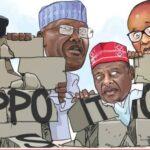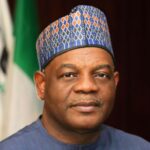The National Working Committee (NWC) of the ruling All Progressives Congress (APC) has said it is working towards the implementation of former Governor Nasir El-Rufai committee’s report on true federalism.
APC’s deputy national organising secretary, Nze Chidi Duru, disclosed this during an interactive session with newsmen at the weekend in Abuja.
Recall that the APC had set up a 23-man committee on true federalism, headed by Mallam Nasir El-Rufai, which submitted its report on January 14, 2018.
The committee recommended that power be devolved to states on issues, such as policing and resource control, among many others. But the report was not implemented by the administration of President Muhammadu Buhari.
- Ganduje, Gawuna make Gov. Yusuf’s Elders Council
- RED CARD: UK-based Player Who Rejected Ghana’s call to miss club matches till day to AFCON end
Following this, a former national vice chairman (North West), Salihu Mohammed Lukman, had in a statement titled, ‘Rebuilding the APC to Reform Nigerian Politics: Task Before President Asiwaju Bola Ahmed Tinubu’, attributed the failure to implement the report to the “existence of weak structures of the party.”
He argued that the failure to implement the report had affected the party negatively.
But Duru disclosed that there were internal moves by the Dr Abdullahi Umar Ganduje-led NWC to ensure the implementation of the report.
Duru, a member of the NWC from Anambra State, said, “It has become an article in the APC and for APC; in the ideology and philosophy of the party on the basis of which the current administration campaigned. The issue of devolution of power and restructuring is clearly embedded in that report.
“As much as we are making the efforts internally to throw up that report to hold the government to account and to implement five points on the basis of which we campaigned to Nigerians, I will charge the fourth estate of the realm to throw it as a Bible and article of faith on the face of our leaders to ensure that, that part of the report is implemented.
“It is good for Nigeria, it will work for Nigerians and it will be best for Nigeria because what that would have achieved is that the overhead cost in governance will be substantially removed, a level-playing field both in business and politics will be enhanced and Nigerians in their area of influence will have sense of belonging.”

 Join Daily Trust WhatsApp Community For Quick Access To News and Happenings Around You.
Join Daily Trust WhatsApp Community For Quick Access To News and Happenings Around You.


